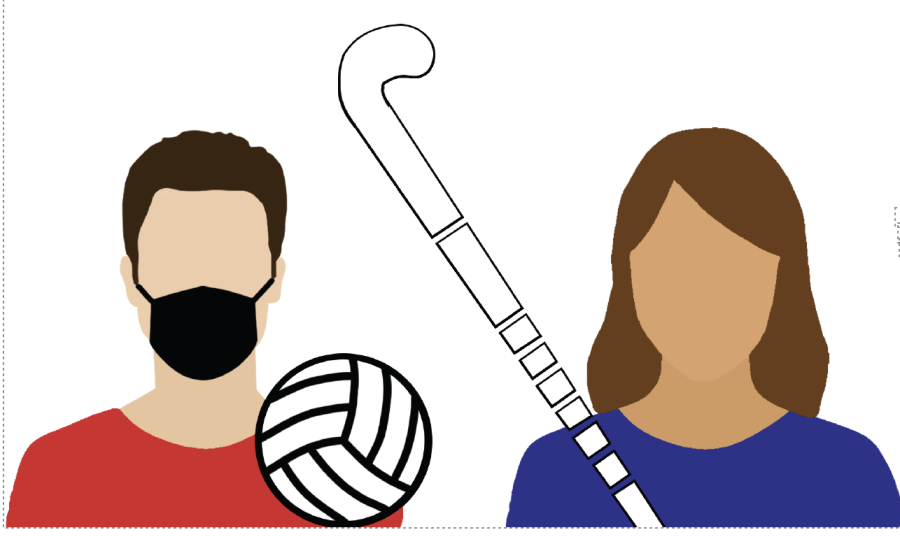Student-athletes required to wear masks to play indoor sports
Graphic illustration by Emma Cionca
Sports like volleyball require masks indoors whereas outdoor sports like field hockey do not require masks.
October 6, 2021
Breathing properly is essential for student-athletes to achieve their highest athletic performance. While masks are still required for Lynbrook athletes competing in indoor sports, outdoor sports, such as tennis and field hockey, have lifted the mask mandate.
During the 2020-21 school year, student-athletes completed a daily symptom form before and after practices. If a team member tested positive for COVID-19, Lynbrook was easily able to identify exposed athletes by tracking the daily check-in form. Aside from daily symptom checks, student-athletes also completed a PCR COVID-19 test two to three times a week before their games. However, these procedures have been completely removed as of August 2021, and the only requirement Lynbrook currently implements is wearing masks while playing indoor sports.
“I would prefer to not wear masks during strenuous exercise and, instead, get tested every two to three days, similar to the procedures we had last year, ” junior volleyball player Sruti Elangovan said.
Although many Lynbrook athletes dislike wearing masks while exercising, most prefer wearing surgical masks over cloth masks and N95 masks because surgical masks are comparatively more breathable while being able to block out germs, bacteria and viruses. Being single-use only also makes them easier to dispose of after every practice, which is preferable to washing sweaty cloth masks.
“I don’t like wearing cloth masks when playing because sometimes cloth masks fit you so perfectly that it makes it harder for you to breathe,” sophomore field hockey player Halie Yung said. “Surgical masks work better for me because they’re more breathable and block out more bacteria.”
According to Santa Clara Public Health guidelines, masks are not required during outdoor activities. Outdoor sports, such as tennis, allow players to social distance and provide constant airflow.
“Most of the team takes off their mask when playing, but when they’re not playing or outside the court, they usually put their masks back on,” sophomore tennis player Anne Sakai said. “Compared to last fall season, we are now allowed to take off our masks during practice, which makes running a lot easier.”
Conversely, masks are required indoors because in an enclosed setting, such as the gym or field house, the virus can easily accumulate and spread. Although masks help to prevent the spread of COVID-19, wearing them during practices heavily impacts athletes’ performance. Wearing masks while exercising can lead to shortness of breath, fatigue, dizziness, headaches and the deterioration of muscle strength, which can significantly impact athletic performance.
“Wearing masks definitely hindered my athletic performance,” Elangovan said. “It was hard for me to see where the ball was when it was underneath my mask, which made it harder to move and pass the ball.”
Furthermore, it is a hassle to remember to bring and change masks every day before practices and games.
“There are already 1,000 things to worry about when you’re on the court and playing volleyball, but worrying about masks just adds to the list and doesn’t make things easier,” Elangovan said.
Lynbrook athletes have mentioned that wearing masks not only negatively impacts their athletic performance but also impedes effective communication, which is crucial for team sports. This includes talking about game strategy on the court and cheering for teammates off the court.
“We’re already trying to cheer as loud as we can, but because of the mask, sometimes people on the court can’t hear us as well,” Elangovan said. “Sometimes when the coach is trying to tell me to do something or serve a spot, I can’t always hear him.”
Because of COVID-19, athletes are adapting to new guidelines everyday. The mask mandate is a prime example of how Lynbrook athletes are continually impacted by the receding pandemic, as it hinders their athletic performance and efficiency to communicate among team members.



























































